
Grow Detroit's Young Talent
Even as the U.S. economy has climbed out of the Great Recession, the labor force participation of low-skill workers has lagged. In many high-poverty urban areas, more than half of low-educated men have exited the labor market.1 In Detroit, 22 percent of youth ages 16 to 24 are not in school and not working or actively looking for work. These youth are disconnected at a crucial time for establishing career pathways and transitioning from education to work.
Grow Detroit’s Young Talent (GDYT), a summer employment program for young adults, seeks to introduce youth to the world of work, build skills, and provide career opportunities to disrupt this pattern. The program was created by the Detroit Youth Employment Consortium (DYEC), a private-public partnership dedicated to advancing Detroit youth’s educational and career development through increased quality and access to employment opportunities. Through summer employment, GDYT seeks to provide work readiness and other “soft-skills” that employers seek, as well as create pathways to professional networks, adult mentors, and future opportunities.
In early 2017, the Youth Policy Lab at the University of Michigan established a partnership with the agencies in Detroit that manage the City’s summer youth employment program — Connect Detroit and the Detroit Employment Solutions Corporation (DESC). Our goal is to provide these agencies with technical assistance, helping them leverage existing administrative data to better understand the impacts of the program. This brief presents our initial findings.

Key findings
- Roughly 15 percent of eligible Detroit youth apply to participate in Grow Detroit’s Young Talent, the city’s summer youth employment program.
- Applicants come from slightly more advantaged neighborhoods and schools, and Black and female youth are more likely to apply than others.
- Two years after participation, GDYT youth are more likely to remain enrolled in school, less likely to be chronically absent, more likely to take the SAT, and more likely to graduate high school.
- The benefits of participation are largest for youth who enter high school with the weakest academic skills.
